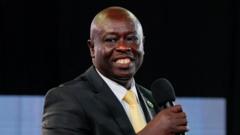Kenyan Deputy President Rigathi Gachagua's impeachment trial took an unexpected turn as he was hospitalized, unable to appear before the Senate. His lawyer, Paul Muite, disclosed that Gachagua's illness has led to a suspension of proceedings, which were scheduled to culminate in a vital vote regarding his future in office. The Senate Speaker, Amason Kingi, emphasized that the trial must conclude by Friday, indicating that the process could advance even in Gachagua's absence unless exceptional circumstances were documented for his later appearance.
This unfolding scenario comes as Gachagua faces a daunting list of 11 charges, including corruption and inciting ethnic strife, following a tumultuous relationship with President William Ruto. The rift between the two leaders, who once campaigned together, became evident after Gachagua criticized the handling of mass protests against tax increases, leading to a significant shakeup in Ruto's cabinet.
Critics of Gachagua have framed the allegations against him as severe, with lawmakers presenting claims of constitutional violations and corruptly amassed wealth during his tenure. During the ongoing impeachment trial, politicians and witnesses have clashed over the validity of these accusations, raising questions about the integrity of the evidence presented.
As discussions surrounding Gachagua’s potential removal intensify, speculation about possible successors is already stirring in political circles. The outcome of this trial is set to define not only the political landscape in Kenya but also the future of the relationships within the ruling coalition. Should Gachagua face impeachment, he has indicated plans to contest the decision, further complicating an already fraught political atmosphere.
This unfolding scenario comes as Gachagua faces a daunting list of 11 charges, including corruption and inciting ethnic strife, following a tumultuous relationship with President William Ruto. The rift between the two leaders, who once campaigned together, became evident after Gachagua criticized the handling of mass protests against tax increases, leading to a significant shakeup in Ruto's cabinet.
Critics of Gachagua have framed the allegations against him as severe, with lawmakers presenting claims of constitutional violations and corruptly amassed wealth during his tenure. During the ongoing impeachment trial, politicians and witnesses have clashed over the validity of these accusations, raising questions about the integrity of the evidence presented.
As discussions surrounding Gachagua’s potential removal intensify, speculation about possible successors is already stirring in political circles. The outcome of this trial is set to define not only the political landscape in Kenya but also the future of the relationships within the ruling coalition. Should Gachagua face impeachment, he has indicated plans to contest the decision, further complicating an already fraught political atmosphere.




















